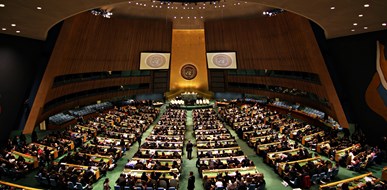Two souls in one breast: The international institutional lawyer as scholar and as practitioner
Published 27 January 2019
Law vs. administration, scholarship vs. practice and international lawyering vs. international civil service: International institutional lawyers often have to be scholars and practitioners at the same time. © Flickr.
The Asser Institute is pleased to host an OXIO Talk on the experiences and challenges of being an international institutional lawyer – both as academic and as practitioner. The event features an informal conversation between Gabrielle Marceau and Niels Blokker, with Catherine Brölmann moderating.
International institutional law builds on a wide variety of legal sources and different forms of legal labour. It constitutes a domain of international law, which is deeply embedded in the law of treaties, the doctrine of sources and the doctrinal schemes that structure international legal thought. Yet, at the same time, international institutional law also manifests itself as a technical, splintered and pragmatic practice, fine-tuned to the managerial exigencies of international bureaucratic life.
In this context, it is not surprising to find many scholars-practitioners who give life and meaning to this binary character of international institutional law. If, indeed, as Martti Koskenniemi phrased it, international law is what international lawyers do and how they think, it seems relevant to reflect on the particularities of this professional identity – the challenges it entails, the different audiences it addresses and the sensibilities it fosters. Multiple dualities and dilemmas seem to be involved in this role: law vs. administration, scholarship vs. practice, international lawyering vs. international civil service. How does one move between the esprit de corps of international law and a managerial, outcome-oriented practice in international organisations? How has the authority, fate, and outlook of international law(yers) evolved in these organisations, where, as one scholar-practitioner observed, one sometimes ‘has to avoid talking, acting and even thinking like a lawyer’. And what does this tell us about the nature of international institutional law: can we distill a conceptual or normative unity from the deformalised and fragmented practices that constitute this professional field?
The event will take place at the Asser Institute on 7 March 2019, 17:00-18:30, followed by a reception. Click here to register for the event.




